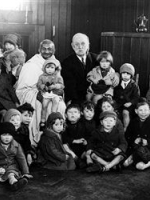There are more than two thousand critical works on Gandhi. Below is a small selection of those:
Arnold, David, Gandhi (Harlow: Longman, 2001)
Bakshi, S. R., Gandhi and Concept of Swaraj (New Delhi: Criterion Publications, 1988)
Brown, Judith M., Gandhi's Rise to Power: Indian Politics, 1915-1922 (London: Cambridge University Press, 1972)
Brown, Judith M., Gandhi and Civil Disobedience: The Mahatma in Indian Politics, 1928-34 (Cambridge, Cambridge University Press, 1977)
Brown, Judith M., Gandhi: Prisoner of Hope (New Haven: Yale University Press, 1989)
Brown, Judith M., 'Gandhi, Mohandas Karamchand [Mahatma Gandhi] (1869–1948)', Oxford Dictionary of National Biography (Oxford University Press, 2004) [http://www.oxforddnb.com/view/article/33318]
Chandra, Bipan, Essays on Indian Nationalism (New Delhi: Har-Anand Publications, 1993)
Chatterjee, Margaret, Gandhi's Religious Thought (Basingstoke: Macmillan Press, 1983)
Chakrabarti, Atulananda, Gandhi and Birla (Calcutta: General Printers and Publishers, 1955)
Dhar, Niranjan, Aurobindo, Gandhi and Roy: A Yogi, a Mahatman and a Rationalist (India: Minerva, 1986)
Gandhi, Mahatma, and Iyer, Raghavan, The Moral and Political Writings of Mahatma Gandhi, 3 vols (Oxford: Clarendon Press, 1986-87)
Gupta, Manmath Nath, Gandhi and His Times (New Delhi: Lipi Prakashan, 1982)
Herman, Arthur, Gandhi and Churchill: The Epic Rivalry that Destroyed an Empire and Forged Our Age (New York: Bantam Books, 2008)
Hunt, James D., Gandhi in London (New Delhi: Promilla, 1978)
Krishnan, Asha, Ambedkar and Gandhi: Emancipators of Untouchables in Modern India (Mumbai: Himalaya Publishing House, 1997)
Majeed, Javed, Autobiography, Travel and Postnational Identity: Gandhi, Nehru and Iqbal (Basingstoke: Palgrave Macmillan, 2007)
Malhotra, S. L., From Civil Disobedience to Quit India: Gandhi and the Freedom Movement in Punjab and Haryana, 1932-1942 (Chandigarh: Punjab University Publication Bureau, 1979)
Mathur, D. B., Gandhi, Congress and Apartheid (Jaipur: Aalekh Publishers, 1986)
Mehrotra, S. R., Gandhi and the British Commonwealth (New Delhi: Indian Council of World Affairs, 1961)
Nanda, Bal Ram, Gandhi and His Critics (Delhi; Oxford: Oxford University Press, 1985)
Nehru, Jawaharlal, Jawaharlal Nehru: An Autobiography. With Musings on Recent Events in India, Etc. [with Plates, Including Portraits.] (London: John Lane: London, 1936)
Parekh, Bhikhu C., Colonialism, Tradition and Reform: An Analysis of Gandhi's Political Discourse (New Delhi; London: Sage, 1989)
Parekh, Bhikhu C., Gandhi's Political Philosophy: A Critical Examination (Basingstoke: Macmillan, 1989)
Patil, V. T., Gandhi, Nehru and the Quit India Movement (Delhi: B. R. Pub. Corp., 1984)
Ramakrishnan, Padma, Gandhi and Indian Independence (New Delhi: Blaze Publishers and Distributors, 1994)
Roberts, Elizabeth, Gandhi, Nehru and Modern India (London: Methuen, 1974)
Sharma, Shri Ram, Gandhi: The Man and the Mahatma (Chandigarh: Rajan, 1985)
Singh, G. B., Gandhi: Behind the Mask of Divinity (Lahore: Vanguard Books, 2005)
Swan, Maureen, Gandhi: The South African Experience (Johannesburg: Ravan Press, 1985)
Tidrick, Kathryn, Gandhi: A Political and Spiritual Life (London: I. B. Taurus, 2006)
Wadhwa, Madhuri, Gandhi Between Tradition and Modernity (New Delhi: Deep and Deep Publications, 1991)
Zakaria, Rafiq, Gandhi and the Break-Up of India (Mumbai: Bharatiya Vidya Bhavan, 1999)
